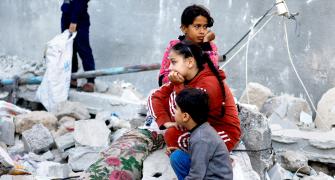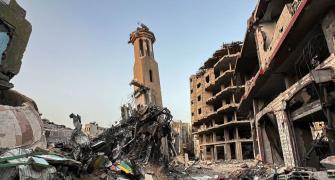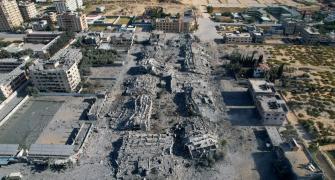'Israelis arrested us before this war and continue to do so -- even more so -- now.'

In a seven-day truce in November last year, a month after the Hamas-led massacre killed 1,200 people in southern Israel, Hamas freed 110 hostages, including 80 Israelis. Israel in turn freed 240 Palestinian prisoners.
Of these Palestinian prisoners, 107 were children, and 75 per cent of them had not been convicted of a crime.
Israel holds nearly 10,000 Palestinians, including women and children, from Gaza and West Bank in custody,
While the Palestinian Authority governs 40% of the West Bank, security of the area remains with Israel. Israeli settlers and Palestinians in the West Bank are also tried by different courts -- military courts for Palestinians and civil courts for Jewish Israeli settlers living in the same occupied territory.
The army commanders in military courts have executive, legislative and judicial authority over the Palestinians living in the West Bank.
"So though Israeli settlers and Palestinians live in the same area in the West Bank and may have committed the same crime, they are tried in different courts under different laws where different processes are followed," says Raed Abu Hommus, who heads the International Relations unit of Commission of Detainees and Ex-Detainees Affairs.
The Palestinian Authority set up the Commission in 1998 under the Oslo Accord to look into the welfare of Palestinian prisoners in Israeli jails as well as their families.
"Many prisoners in Israeli jails are being held simply for participating in a gathering of over 10 people without a permit. This is banned by Israeli forces which control security in the West Bank," says Raed.
As Israel enters its 12th week of air and ground invasion in Gaza that has killed more than 24,000 Palestinians, in an interview with Rediff.com's Swarupa Dutt, Raed explains the work the Commission does and how Israel is taking revenge on Palestinian prisoners since October 7.
Part one of a two-part interview:
Tell us about the nature of the work that the commission does.
I am the head of the International Relations unit in the Commission of Detainees and Ex-detainees Affairs. This is a government body concerned with Palestinian prisoners in Israeli prisons.
This commission is in fact, extraordinary because it's the only body of its kind in the world.
We deal with the sensitive issue of freedom fighters for Palestine.
We are not like any other ministry. We work round the clock, we are always available on the phone so that families can call us any time.
In fact, more than half of the employees in the Commission are ex-detainees. So they really know what they are doing and what they are up against.
So, how it works is: We have an emergency room that is made up of more than 60 lawyers who work with the military courts in the West Bank. They work on cases for any Palestinian who gets arrested.
The way it happens is that people -- generally the family members of the detained Palestinian -- call us at our offices. We then send e-mails to the lawyers. The lawyers first begin by locating where the prisoner is -- in which jail.
Then when the case approaches the military court, we appear for the detainee and follow up on the case. If he is sent to prison, we visit him and keep the family posted.
We have a media department that that keeps the issues of Palestinian prisoners in the Israeli jails issue alive in the international media and the local media. Every day, we also have new reports for the press.

What is the difference between the ministry that goes by the same name and the Commission?
Earlier it was a ministry, now it's called the commission, with an office in Ramallah in the West Bank.
You work for the liberation of Palestinian prisoners from Israeli prisons. What is the likelihood of liberation?
This is a very sensitive issue for all Palestinians. It's not easy for anyone to be released.
Thousands of Palestinians are brought before military courts for charges that include entering Israel without a permit, throwing stones, membership in 'illegal' bodies, violence (throwing Molotov cocktails), firearms-related offenses and minor traffic violations - which account for majority of indictments in a year.
The commission follows cases to the courts, but since it's not a normal court, and a military court, justice for the defence is impossible.
We stay connected with Palestinian prisoners through the lawyers, and we get reports daily from prisons, which is shared with the media and the families of the prisoners.
What is the percentage of prisoners you have been able to release from jails?
I won't be able to tell you in exact percentage terms, but for example, every day if say, 50 to 60 Palestinians are arrested, 15 will be released. Israelis detain anyone -- children, women, elderly and young men. If the detainees are not involved in politics or in demonstrations, it's easier to get them out. For other charges like holding demonstrations or throwing stones or Molotov cocktails it is not easy to get them released.
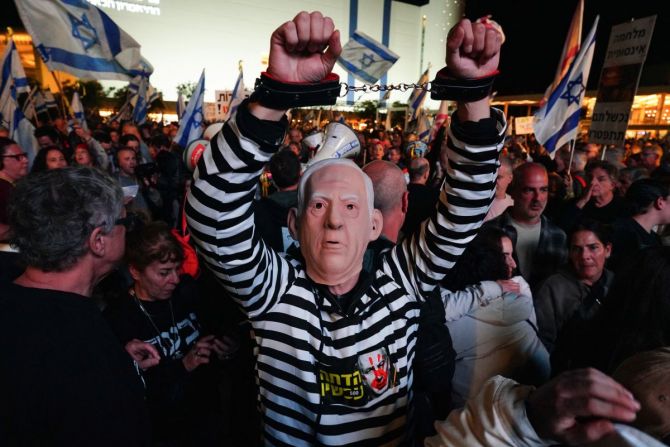
Explain the military courts that are ubiquitous to Israeli occupation of Palestinian territories.
Israeli military courts were first established in 1967 when the Occupation began. They were authorised to try anyone who committed an offence in the West Bank. These included settlers -- Israeli citizens from Israel and foreign nationals.
However in the 1980s, it was decided that Israeli citizens would be tried in the Israeli civilian court system according to Israeli laws, even if they live in the Occupied Territories and the offence was committed in the Occupied Territories.
But Palestinians in the West Bank continue to be tried by the military courts and the sentencing is according to the provisions of military orders. Under Israeli military law, army commanders have sole executive, legislative and judicial authority over the 3 million Palestinians living in the West Bank.
So, what it means is that even if you have committed the same offence -- you will be tried in different courts under different laws -- depending on whether you are Israeli or Palestinian.
Military courts don't operate in Gaza after Israel withdrew its military forces from there in 2005, but continue to operate in the West Bank.
So, despite the Oslo Accords and the establishment of the Palestinian Authority for Palestinians in the West Bank, this military-judicial system is what is in place.
In fact Israel uses the Fourth Geneva Convention to justify military courts but the same Convention prohibits construction of settlements in the West Bank.
[The Israeli NGO Peace Now's report says there is an 'unprecedented' increase in Jewish settlements in the occupied West Bank since October 7. The report says nine 'settlement outposts' and 18 new roads for settlers have been constructed since this war in Gaza.]
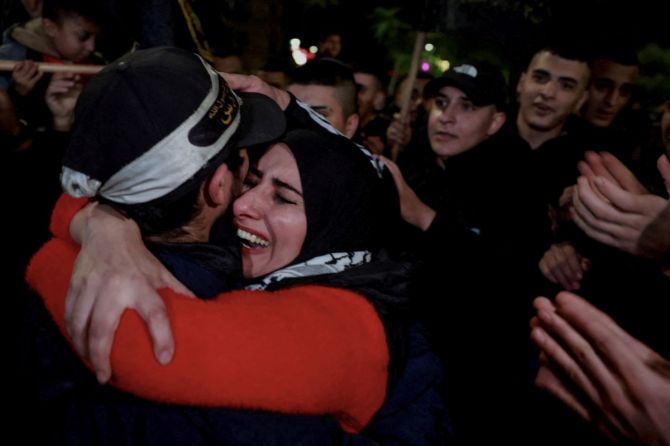
How many cases on an average do the military courts try in a year? What is the rate of convictions?
Approximately 750,000 Palestinian men, women and children have been detained since 1967, when after the 6-Day War military law was imposed by the Israeli authorities in the West Bank and the Gaza Strip.
As of now, around 500-1,000 children are detained each year and most of the prosecutions are for stone throwing.
Around 95 per cent of cases tried in military courts end in conviction.
1,800 military orders have been issued since 1967 by these courts ,but only a few have been translated into Arabic. They are written in Hebrew.
Under the Fourth Geneva Convention the orders have to be translated into Arabic and if they are not, then these orders have no legality.
Most Palestinian prisoners cannot read Hebrew. So you understand how the legal system is skewed against us.
So, would it be right to say that every single day Israelis detain Palestinians in the West Bank?
Yes. Every single day Palestinians are detained -- and that's true for both before the war and now. The number of detainees is much more now than before this war. On an average 80 to 90 detentions take place every day now.
If these Palestinians are placed under administrative detention, then it is incarceration without trial or any charge, simply on the basis that Israel believes the person 'plans' to commit an offense 'sometime in the future'.
And, of course, the detention can be extended indefinitely based on 'secret information', which the detainee has no access to.

The commission also helps ex-detainees. How do you do that?
We provide health insurance for the ex-detainee and his entire family. If a detainee spends five years in prison, after release, he will get a government job -= that's a guarantee. The Palestinian Authority also provides a one-time grant to released prisoners of $1.000 to $6,000 for those with 11-to-15-year terms. For those who have served over 30 years in jail, the grant is $25,000.
The unemployment rate in the Occupied Territories and West Bank is around 24%. What is the likelihood of prisoners who have been released getting their jobs in the private sector and do they get their old jobs back?
If they were in government jobs, they will get the job back after they are released, but not necessarily in the private sector.

A statement released by your commission said that there are roughly 4655 detainees in the West Bank since October 7.
The commission said during the arrests, there was harassment, beatings, threats, against the detainees, their families and destruction of homes. Can you elaborate?
We are under occupation and live in an open prison. Israelis arrested us before this war and continue to do so -- even more so -- now.
They come to your house mostly after midnight. There is no midnight knock on the door - they simply break the door open. It's like an explosion at that time of the night.
You lose money every time this happens because they break everything in the house. If they come to your house, you know, you will be spending a minimum of 5000 shekels (around USD 1400) in repairs. And of course they pick you up, beat you and throw you in prison or maybe administrative detention.
If you are in administrative detention it means they will not tell you why you have been picked up, just that Israeli intelligence thinks you are dangerous for the security of the State of Israel.
You will be in administrative detention for at least six months. Then after the six months, they can give you another six months and then another. And it goes on like this, without you even knowing why you are in prison.
There are 2,870 Palestinians under administrative detention in the West Bank. The number you gave me -- 4,655 - these were people arrested after October 7, some of who have been released. So the total number of detainees is 7,800 in the West Bank.
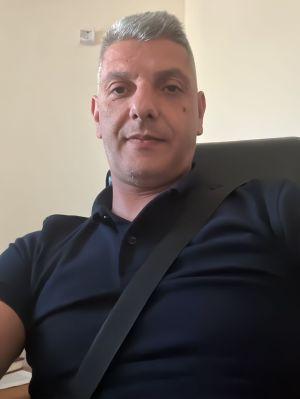 IMAGE: Raed Abu Hommus
IMAGE: Raed Abu HommusHow does the commission help somebody in administrative detention?
The family of the person who has been arrested by the Israelis contacts the commission and then the process begins.
This is Palestine. It's a small country. It's made up of small cities, towns, and people generally know each other and know of organisations or a commission like ours. We don't have big cities where people are anonymous. We are known in the West Bank and in Gaza.
So for instance, if the family of the detainee doesn't know our phone number, a friend, a neighbour, someone will certainly know because at one time or the other they have used our services. We help people in Gaza too. We have an office there.
After approaching the military court and if the person is still sent to prison, we approach the higher court. If there are no charges against him, we seek a release and sometimes we win these cases. If we don't, the detainee sometimes goes on hunger strike.
And does that work?
It's not easy. If a Palestinian is arrested and put under administrative detention, it's not easy to get him out for a minimum of six months. And thereafter maybe, maybe not.
- Part 2 of the Interview: 'Israelis have no morals, no ethics'
Feature Presentation: Aslam Hunani/Rediff.com

